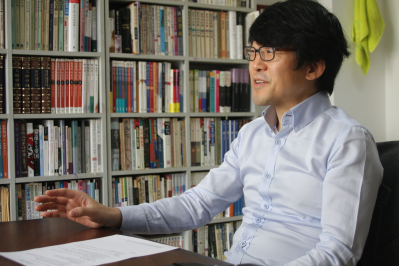
Professor Lyou is the director of Ewha Digital Storytelling R&D Center (DSC) which is the oldest IT integration school in Korea. The center searches for ways to develop digital storytelling in Korea and works on systematizing the process of story creation. At the same time, professor Lyou is more popularly known as the best-seller author Lee In-hwa whose historical novel Eternal Empire in 1993 remade into an awardwining movie.
“Once I visited the Cheongwadae for the Culture and Tourism Committee meeting as an author but couldn’t get in,” professor Lyou said. “The guards said that they were expecting the author Lee In-hwa which is my pen name, but my name card read Lyou Chul-gyun, my actual name. This is what happens when you use two names.”
Digital Storytelling R&D Center was established in 2003 to receive financial support from the Ministry of Information and Communication by taking part in the Information &Technology integration talent developing project. Since its establishment, other universities that realized the need for integrated study followed.
“Ewha is the first university in Korea to make an IT integration major,” professor Lyou said. “I can proudly say that all second movers of IT integration schools in Korea have requested Ewha for support and advice to build their own IT integration schools.”
Many conflicts arise as two very different studies try to integrate as one. Studies that have totally different method of study and evaluation are hard to bind together. That is why Ewha DSC became a domestic reference to other universities in Korea.
As professor Lyou was deeply engaged in Korean Literature, not only as an author but also a professor, he continuously searched for ways to overcome the limitation of liberal arts studies.
Professor Lyou realized that there was no way he could find a breakthrough in the liberal arts itself. He believed that integration of liberal arts and IT was the answer to his search.
“While I was looking for a way to leap over limitations in studying liberal arts, I was moved by a book called Hamlet on the Holodeck by professor Janet Murray of Georgia Institute of Technology,” professor Lyou said. “It gave me an idea that digital storytelling could be a research area to break through liberal arts’ limitation in study so that I adopted digital storytelling in Ewha.”
Research in the field of liberal arts usually takes an analytical approach in the viewpoint of a reader. For example, scholars in the field of liberal arts focus on semiologic or documentary history of a literature piece, which are limited to interpretation of a reader. It cannot provide the process of creation in the writer’s perspective. Professor Lyou studied digital storytelling as the way to overcome the limitation of liberal arts.
“Digital storytelling made it possible for the researchers to reenact the process of creation,” professor Lyou said. “When a creative process encounters computer technology, it can try to record the process of creation through the language of computer programming. That way, anyone who is capable of decoding computer language can reenact the process of creation.”
Professor Lyou mentioned that the digital storyteller program reached the level of being able to verify a thesis of story making process. It is made possible by copying the nervous system of the brain to the computer when creating a story.
“The storyteller can actually create an elaborate story which is hard to distinguish from essays written by people,” professor Lyou said. “Although it is far from writing a story for a movie or a television show, Ewha DSC created a digital storyteller that has come close to recreating a full creation process.”
In order to fully understand the mechanism of a story, professor Lyou made up his mind to start on-line games in 2003, as Ewha DSC was established. He expected that the game industry was going to require the research of digital storytelling in a few years. He observed the story inside on-line games and tried to find the logic in them. When he thought watching and analyzing was not enough, he began playing on-line games himself at the age of 33.
“Before 2003, I had absolutely no experience of playing any types of game,” professor Lyou said. “Still, I saw that the game industry was in close relationship with our research so that I began playing on-line games to be part of the research Ewha DSC will be doing.”
Emphasizing passion, professor Lyou advises Ewha students to be immersed in something at least once in their lives.
“Life is short,” professor Lyou said. “There is no guarantee that you will be happy if you work in an area you are interested in; you can get bored of it or take a dislike to the job any day. Find something absorbing, what makes you really fall for the work. It may be a life changing experience to be immersed in one particular area.”
Lee Ha-kyung
voteforkate@ewhain.net

